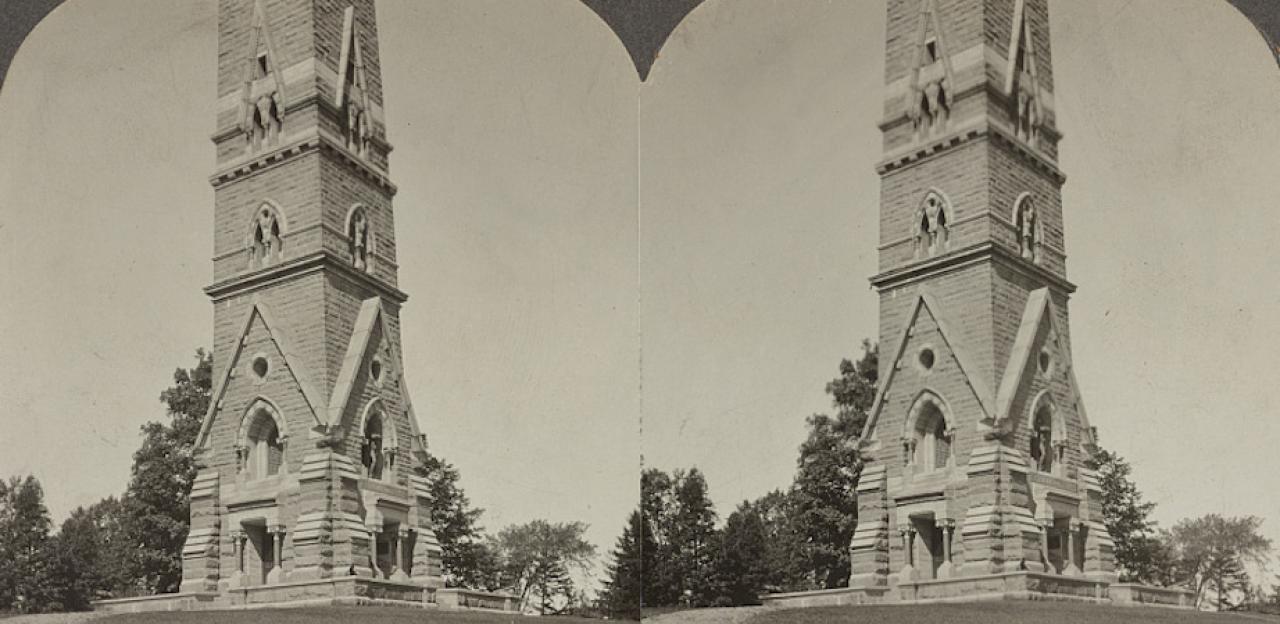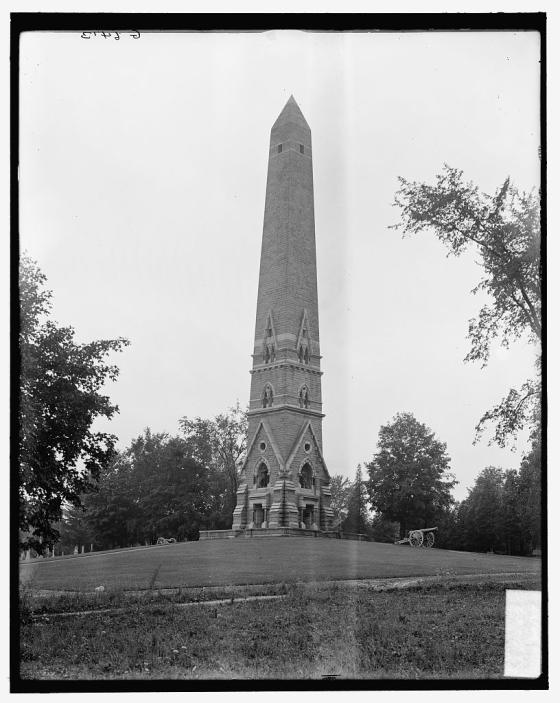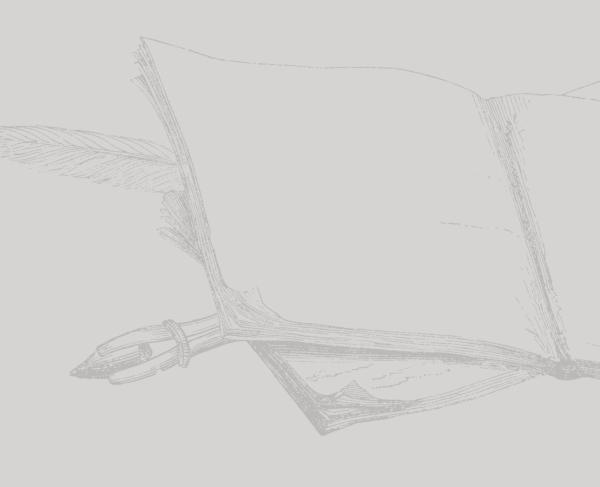Speech Excerpts from the Cornerstone Laying Ceremony for the Saratoga Monument

Two excerpts from speeches delivered by Horatio Seymour and George William Curtis during the ceremony that laid the first cornerstone of the Saratoga Monument on October 18, 1877.

Excerpt from Address delivered by Horatio Seymour
ONE hundred years ago, on this spot, American independence was made a great fact in the history of nations. Until the surrender of the British army under Burgoyne, the Declaration of Independence was but a declaration. It was a patriotic purpose asserted in bold words by brave men, who pledged for its maintenance their lives, their fortunes, and their sacred honor. But here it was made a fact, by virtue of armed force. It had been regarded by the world merely as an act of defiance, but it was now seen that it contained the germs of a government which the event we celebrate made one of the powers of the earth. Here rebellion was made revolution. Upon this ground, that which had in the eye of the law been treason, became triumphant patriotism. At the break of day, in the judgment of the world, our fathers were rebels. When the echoes of the evening gun died away along this valley, they were patriots who had rescued their country from wrong and outrage. We had passed through the baptism of blood, and gained a name among the nations of the earth.
Before the Revolution the people of the several colonies held but little intercourse. They were estranged from each other by distance, by sectional prejudices, by differences of lineage and religious creeds. But when the men of Virginia went to Massachusetts to rescue Boston, when the men of the East and South battled side by side with those from the Middle States, when Greene and Lincoln went to the relief of the Southern colonies, all prejudices not only died away, but more than fraternal love animated every patriotic heart from the bleak forests of New England to the milder airs of Georgia. And now that a hundred years have passed, and our country has become great beyond the wildest dreams of our fathers, will not the story of their sufferings revive in the breast of all the love of our country, of our common country, and all who live within its boundaries?
It was the most remarkable fact of the Revolutionary war and of the formation of State and national governments, that although the colonists were of different lineages and languages, living under different climates, with varied pursuits and forms of labor, cut off from intercourse by distance, yet, in spite of all these obstacles to accord, they were from the outset animated by common views, feelings, and purposes. When the independence was gained, they were able, after a few weeks spent in consultation, to form the constitution under which we have lived for nearly one hundred years. There can be no stronger proof that American institutions were born and shaped by American necessities. This fact should give us new faith in the lasting nature of our government.
Monuments make as well as mark the civilization of a people. The surrender of Burgoyne marks the dividing line between two conditions of our country: the one the colonial period of dependence, and the other the day from which it stood full-armed and victorious here, endowed with a boldness to assert its independence, and endowed with a wisdom to frame its own system of government. We are told that during more than twenty centuries of war and bloodshed, only fifteen battles have been decisive of lasting results. The contest of Saratoga is one of them. Shall not some suitable structure recall this fact to the public mind? Neither France, nor Britain, nor Germany could spare the statues or works of art which keep alive the memory of patriotic services or of personal virtues. Such silent teachers of all that ennobles men, have taught their lessons through the darkest ages, and have done much to save society from sinking into utter decay and degradation. If Greece or Rome had left no memorials of private virtues or public greatness, the progress of civilization would have been slow and feeble. If their crumbling remains should be swept away, the world would mourn the loss, not only to learning and arts, but to virtue and patriotism. It concerns the honor and welfare of the American people that this spot should be marked by some structure which should recall its history and animate all, who look upon it, by its grand teachings. No people ever held lasting power or greatness who lid not reverence the virtues of their fathers, or who did not show forth this reverence by material and striking testimonials.
Let us, then, build here, a lasting monument, which shall tell of our gratitude to those who, through suffering and sacrifice, wrought out the independence of our country.
Excerpt from Address delivered by George William Curtis
THE drama of the Revolution opened in New England, culminated in New York, and closed in Virginia. It was a happy fortune that the three colonies which represented the various territorial sections of the settled continent were each, in turn, the chief seat of war. The common sacrifice, the common struggle, the common triumph, tended to weld them locally, politically, and morally together. Doubtless there were conflicts of provincial pride and jealousy and suspicion. In every great crisis of the war, however, there was a common impulse and devotion, and the welfare of the continent obliterated provincial lines.
It is by the few heaven-piercing peaks, not by the confused mass of upland, that we measure the height of the Andes, of the Alps, of the Himalaya. It is by Joseph Warren not by Benjamin Church, by John Jay not by Sir John Johnson, by George Washington not by Benedict Arnold, that we test the quality of the Revolutionary character. The voice of Patrick Henry from the mountains answered that of James Otis by the sea. Paul Revere's lantern shone along through the valley of the Hudson, and flashed along the cliffs of the Blue Ridge. The scattering volley of Lexington green swelled to the triumphant thunder of Saratoga, and the reverberation of Burgoyne's falling arms in New York shook those of Cornwallis in Virginia from his hands. Doubts, jealousies, prejudices, were merged in one common devotion. The union of the colonies to secure liberty, foretold the union of the States to maintain it, and wherever we stand on Revolutionary fields, or inhale the sweetness of Revolutionary memories, we tread the ground and breathe the air of invincible national union.
So, upon this famous and decisive field, let every unworthy feeling perish! Here, to the England that we fought, let us now, grown great and strong with a hundred years, hold out the hand of fellowship and peace! Here, where the English Burgoyne, in the very moment of his bitter humiliation, generously pledged George Washington, let us, in our high hour of triumph, of power, and of hope, pledge the queen! Here, in the grave of brave and unknown foemen, may mutual jealousies and doubts and animosities lie buried forever! Henceforth, revering their common glorious traditions, may England and America press forward side by side, in noble and inspiring rivalry to promote the welfare of man!
Fellow-citizens, with the story of Burgoyne's surrender, the Revolutionary glory of the State of New York, still fresh in our memories, I am glad that the hallowed spot on which we stand compels us to remember not only the imperial State, but the national Commonwealth, whose young hands here together struck the blow, and on whose older head descends the ample benediction of the victory. On yonder height, a hundred years ago, Virginia and Pennsylvania lay encamped. Beyond, and further to the north, watched New Hampshire and Vermont. Here, in the wooded uplands at the south, stood New Jersey and New York, while across the river to the east, Connecticut and Massachusetts closed the triumphant line. Here was the symbol of the Revolution, a common cause, a common strife, a common triumph; the cause, not of a class, but of human nature; the triumph, not of a colony, but of united America.
And we who stand here proudly remembering, we who have seen Virginia and New York, the North and the South, more bitterly hostile than the armies whose battles shook this ground, we who mutually proved in deadlier conflict the constancy and courage of all the States, which, proud to be peers, yet own no master but their united selves, we renew our heart's imperishable devotion to the common American faith, the common American pride, the common American glory! Here Americans stood and triumphed. Here Americans stand and bless their memory. And here, for a thousand years, may grateful generations of Americans come to rehearse the glorious story, and to rejoice in a supreme and benignant American nationality!
Click here for the full text of ceremonies
